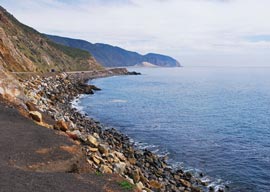
December 02, 2015

Source: Shutterstock
Ever since the modern environmental movement emerged in coastal California in 1969, it’s been apparent that some of the motivation behind it has been to keep the inland masses of Valley Guys from being able to afford toeholds of property along the coast by shackling development. The nativists of Malibu have been remarkably tenacious at keeping out high-rise developments that would make it not quite as stratospherically expensive. Until I visited the intensely developed Turkish Riviera in 2009, I hadn”t realized just how bizarrely empty the coast northwest of giant Los Angeles really is. Even building mansions is for only the most dogged developers. For example, U2’s guitarist the Edge has been battling for ten years to get permission to build five houses on 156 acres he owns on a ridge far above the beach.
Thus, Malibu’s 27 miles of coastline are home to less than 13,000 people, even though the area has been world-famous at least since the Chevrolet Malibu debuted over a half century ago.
I can”t really blame the Malibuites: I probably would do the same thing in their shoes.
Territorialism is the urge; property rights under law are the time-honored solution. Property is seldom absolute in practice because possession inevitably comes with externalities, such as traffic and loss of privacy, that impinge upon other property rights, as the good burghers of Malibu have pointed out to their government officials with such vigor.
But property of some kind is essential because allowing people to individually and jointly exercise long-term stewardship over land reduces slash-and-burn exploitation. Liberal philosopher John Rawls explained how the general logic behind property illuminates the particular case against Open Borders:
Concerning the second problem, immigration…an important role of government…is to be the effective agent of a people as they take responsibility for their territory and the size of their population, as well as for maintaining the land’s environmental integrity. Unless a definite agent is given responsibility for maintaining an asset and bears the responsibility and loss for not doing so, that asset tends to deteriorate. On my account the role of the institution of property is to prevent this deterioration from occurring. In the present case, the asset is the people’s territory and its potential capacity to support them in perpetuity; and the agent is the people itself as politically organized. The perpetuity condition is crucial. People must recognize that they cannot make up for failing to regulate their numbers or to care for their land by conquest in war, or by migrating into another people’s territory without their consent.
The best overall approach to the problem and promise of the territorial imperative is to have moderate amounts of joint property rights at multiple levels of political organization”continental, national, state, county, municipal, or neighborhood”with open and honest argument about what the precise balances should be. The rule for conducting these debates ought to be that nobody’s self-interest is presumed to be either sacred or satanic.
I”m not requesting Malibuites give up their advantages. I just wish they would stop lying about their motivations. And if that’s too much to ask, just stop demonizing less privileged Americans for wanting for their country a few of the protections they have grabbed for their town.